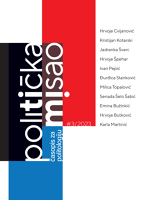Značaj kulture pamćenja za izgradnju kolektivnog identiteta i ontološke bezbednosti: studije slučaja Japana i Kosova
The importance of cultural memory for the construction of collective identity and ontological security: a case study of Japan and Kosovo
Author(s): Đurđica Stanković, Milica TopalovićSubject(s): Politics, Politics and Identity, Identity of Collectives, Peace and Conflict Studies
Published by: Fakultet političkih znanosti u Zagrebu
Keywords: Cultural Memory; Social Constructivism; Japan; Kosovo Myth; Collective Identity;
Summary/Abstract: The collective cultural memory is built on important, often traumatic, historical moments, which are reconstructed in the consciousness of the people by sacralization, transmitted by oral tradition, and maintained by the creation of narratives that consequently become a formative, integrative, and mobilizing factor of collective identity. Strongholds of memory and symbols of collective identity provide permanence and stability to the community in the examples of both Japan and Kosovo*. Although the context of the study of memory is different in the two case studies, the authors find the point of convergence of two seemingly incompatible examples, Japan and Kosovo, in the memory of traumatic events and suffering of both nations through the prism of the culture of memory as a reference theoretical model. Seen through the lenses of social constructivism, the paper aims to answer the question of whether the memory of the nuclear attack tends to change and simplify the Japanese identity, and to explore the potential for the creation of a national myth based on the motives of suffering and sacrifice, as is the case with the Kosovo myth. Also, the research intention is reflected in the determination of the significance, but also the (mis)use of the Kosovo myth in the historical positioning of the Serbian people, both in the construction of our identity and in the creation of distinction in relation to Others. Ontological security, as a learned relationship with Others through the culture of remembering common (in)glorious moments, builds on the existing findings of the general theory of culture by answering the question of why the existence of collective identities through the culture of memory is a topical security issue.
Journal: Politička Misao
- Issue Year: LX/2023
- Issue No: 03
- Page Range: 123-145
- Page Count: 23
- Language: Serbian

